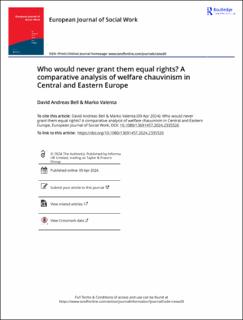Who would never grant them equal rights? A comparative analysis of welfare chauvinism in Central and Eastern Europe
Journal article, Peer reviewed
Published version
Permanent lenke
https://hdl.handle.net/11250/3126893Utgivelsesdato
2024Metadata
Vis full innførselSamlinger
- Institutt for sosialt arbeid [1367]
- Publikasjoner fra CRIStin - NTNU [38013]
Originalversjon
European Journal of Social Work, 1–16. https://doi.org/10.1080/13691457.2024.2335526Sammendrag
Welfare chauvinism is often understood as the sentiment that the benefits and services of the welfare state should primarily be given to the native population and not immigrant minorities. Using linear regression on data from the 8th wave of the European Social Survey, this study explores how political attitudes and negative attitudes towards different immigrant groups affect welfare chauvinistic attitudes in six countries: the Czech Republic, Hungary, Poland, Estonia, Lithuania and Slovenia. In contrast to other studies, we do not find a clear ‘East-West’ distinction between the amount of welfare chauvinistic attitudes found in the six countries compared to Western Europe. Additionally, we find that hostility towards immigrants of a different ethnicity is a strong predictor of welfare chauvinistic attitudes in five of the sampled countries, while in Lithuania, there is an opposite effect, where hostility towards ethnically similar immigrants seem to be a much stronger predictor. Furthermore, we find evidence that individuals with more right-leaning values and political orientation cannot be said to be more welfare chauvinistic. This may indicate a broad agreement in these societies on the exclusion or minimisation of immigrants’ rights to social benefits.

